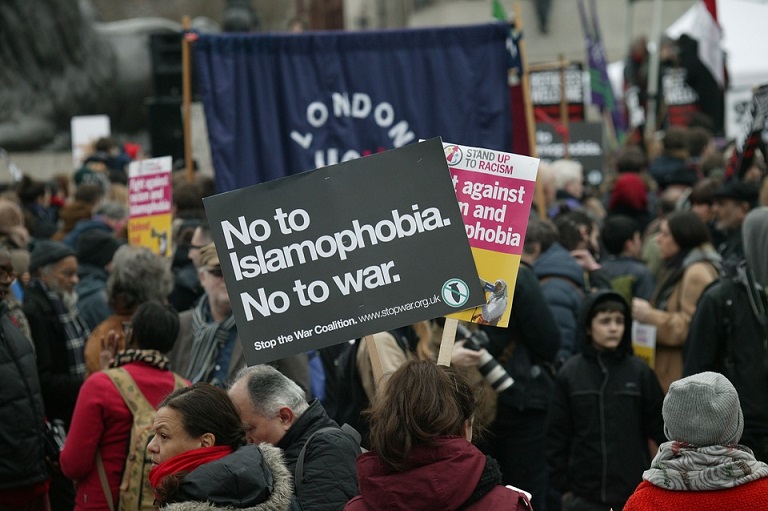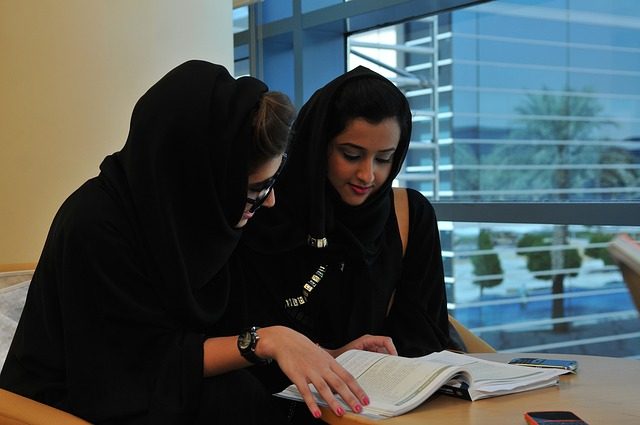In the last decade the term Jihad has catapulted into the public consciousness, instigating feelings of fear, violence and above all holy war.
 Sofia Ahmad
Sofia Ahmad
Islamic Fundamentalists have popularised the idea of Jihad as simply unrestrained indiscriminate warfare against those who they perceive to be the enemies of Islam, when in fact at its most basic level it simply means “to struggle”. What is the truth behind jihad?
Ever since the planes were flown and driven into the twin towers on that fateful day in September, the global political landscape transformed over-night. With it, Islam was perceived as a threat to world peace and a new enemy was born. The “war on terror” was declared, Afghanistan and Iraq were invaded and detention centres were set up where no trial or charge was required to imprison suspects.
Simultaneously new terrorist groups under the guise of Islam were emerging from all continents, suicide bombings became a common phenomenon and the word Jihad or Islamic holy war reverberated around the streets of the world Linguistically the definition of Jihad is “to strive in the path of God”. This could encompass any action that is pleasing to God; helping the poor, struggling with one’s ego, striving to overcome self-interest or indeed it could mean to fight.
 Classicists believe jihad can mean a holy war in offensive terms, however they also carefully formulated a code for lawful war. On the other hand Modernists believe that jihad as a holy war can only be defensive as the Quran overwhelmingly preaches peace. Both schools of thought are grounded in a wealth of academic juristic and scholarly work.
Classicists believe jihad can mean a holy war in offensive terms, however they also carefully formulated a code for lawful war. On the other hand Modernists believe that jihad as a holy war can only be defensive as the Quran overwhelmingly preaches peace. Both schools of thought are grounded in a wealth of academic juristic and scholarly work.
However recently Islamic terrorist groups and figures including Osama bin Laden have carved out a third radical take on jihad; preaching unrestrained indiscriminate warfare against those who they perceive to be the enemies of Islam. It is regretfully the most heard of, yet it has no solid basis in Islam. The complexities of jihad and the centuries of literature on the subject have been swiftly overshadowed. Looking at the historical context in which the “third way” emerged it is clear that this radicalised version of jihad stems from a political agenda masquerading as a religious war.
The twentieth century was accompanied by the collapse of the Ottoman Empire (their territories were divided between the British and the French) and the abolition of the caliph (the official Muslim leader) in 1924.
With this collapse, Muslims found themselves at the mercy of the European empires.
In this new context of Muslim political impotency, new theories of Jihad were being formulated to revive the Islamic world.
 Thinkers and ideologues include Mawdudi and Sayyd Qutb laid down the foundations from which radical groups would develop.
Thinkers and ideologues include Mawdudi and Sayyd Qutb laid down the foundations from which radical groups would develop.
Bin Laden “justifies” the 9/11 attacks by claiming they are a response to atrocities against Muslims in Palestine, Iraq, Somalia, southern Sudan, Chechnya, Nigeria and Kashmir. He believes the world is against Islam and alleges that his aim is to protect oppressed Muslims around the world.
Bin Laden cloaks his political agenda in a religious narrative and in turn re-invented the concept of jihad to justify his cause.
He randomly plucks out quotes from the Quran to support his form of jihad and the innocent killing of civilians, he claims he is following the Prophet Muhammad’s example and often flippantly employs arguments unrelated to Islam to justify his agenda.
For example speaking to Al-Jazeera in 2001 he justified the killing of innocent civilians; “we kill… the civilians among the disbelievers, in response to the amount of our sons they kill; this is correct in both religion and logic”. In this same interview he quotes Quranic passage 5:32 to condemn the innocent killing of Palestinian children by Israel, ironically many scholars use this exact passage against Bin Laden to condemn the innocents that die in terrorist attacks orchestrated or supported by him. He does not enter into a serious academic debate and his arguments are incoherent with Islamic sources and scholarship.
Classical scholars viewed Jihad as a holy war which can be both offensive and defensive. The position adopted by the four major law schools was that peace was preferred when it was in the best interests of Muslims (i.e when they were in a weaker position).
 However the main focus for discussion from classical scholars was always the legal and technical conduct of warfare based on the behaviour of Muhammad when he was engaged in Jihad. Although they allow for an offensive holy war they were mainly preoccupied with codifying the nature of warfare and it is often compared to the Christian just war theory that outlines a number of condition a conflict must follow.
However the main focus for discussion from classical scholars was always the legal and technical conduct of warfare based on the behaviour of Muhammad when he was engaged in Jihad. Although they allow for an offensive holy war they were mainly preoccupied with codifying the nature of warfare and it is often compared to the Christian just war theory that outlines a number of condition a conflict must follow.
They refer to passages in the Quran for example (Q2:190) that states “do not kill women, children, the old, or those who greet you with peace”. Thus attacks should be strictly directed at combatants amongst and other limits relate to the treatment of prisoners, animals and the environment. Moreover war can only be declared by a Muslim leader.
The Modernists emerged in the 1800’s to re-evaluate and challenge classical scholarship on the subject. Led by influential thinkers Muhammad Abduh and Rashid Rida they rejected the classical thesis. They taught that Jihad should purely be a defensive act and that the normal and desired state between Islamic and non-Islamic territories is one of peaceful coexistence.
They laid the foundations for a wealth of literature, emphasising Jihad as a peaceful non expansionist religion. Scholars also began to examine the multiple meanings of jihad including jihad as a spiritual warfare; battling with one’s internal being.
The concept of a “greater” and a “lesser” jihad was introduced, with the “greater jihad” being the spiritual struggle and the “lesser” jihad being that of war. The emphasis was shifted to Islam as a religion of the soul. How can we explain this shift?
 Professor Hashmi believes that the Classicists took their view in order to justify the expansion of Islam as an empire whereas in fact he believes that the Quran overwhelmingly speaks of a defensive jihad. Instead they emphasise the defensive and peaceful verses for example Q2: 256 “there is no compulsion in religion”.
Professor Hashmi believes that the Classicists took their view in order to justify the expansion of Islam as an empire whereas in fact he believes that the Quran overwhelmingly speaks of a defensive jihad. Instead they emphasise the defensive and peaceful verses for example Q2: 256 “there is no compulsion in religion”.
They also refer to the sunnah (prophets example) where the prophet Muhammad preferred peace by creating treaties with Christians and Jews, example can be found from Persia and Egypt to all areas in between. Moreover the Modernists promote a contextualised reading of the Quran. They believe it is absurd to randomly pluck out quotes from the Quran intended for a specific event and universally apply them. The Quran needs to be read in its historical context, this is also a belief that contemporary Islamic thinker Tariq Ramadan preaches and religious analyst Karen Armstrong. Armstrong argues that Muhammad was born into the bloodbath of 7th century Arabia where the old values were being radically undermined and nothing adequate had yet appeared to take their place.
Thus Armstrong insists that the Quran must be understood in the context of a tribal and lawless society, according to her, Muhammad was shaking the foundations of tribal loyalty, elite corruption and waging a jihad of “physical, moral, spiritual and intellectual effort” to create a decent society.
Islamic fundamentalists epitomised by the likes of Osama bin Laden have populated the news headlines and discussion forums with an idea of jihad that is incongruent with both the truth of the term and the religion. Bin Laden and Islamic fundamentalist support and carry out indiscriminate attacks on innocent civilians around the world.
 They transgress both the codified warfare the Classicist believed in, they defy Modernist’s emphasis on peace and defensive jihad and most importantly they are based on a weak justification using insufficient material from Islamic sources. Moreover the four main law schools encourage peace to be sought when Muslims are in a weak position. On the contrary Bin Laden and other extremists are motivated to wage aggressive warfare due to the weak position of Muslims in society today.
They transgress both the codified warfare the Classicist believed in, they defy Modernist’s emphasis on peace and defensive jihad and most importantly they are based on a weak justification using insufficient material from Islamic sources. Moreover the four main law schools encourage peace to be sought when Muslims are in a weak position. On the contrary Bin Laden and other extremists are motivated to wage aggressive warfare due to the weak position of Muslims in society today.
His interpretation is not based on sound academic and juristic readings. He flippantly quotes the Quran without paying attention to the context and intention of the verse, thus ignoring the holistic message. He espouses an incoherent and flawed ideology where rigorous intellectual analysis is more or less absent.
Bin Laden’s ideas rather than being based on orthodoxy and the golden age of Muhammad are in fact an innovative take on Jihad. This innovation is not based on a rigorous study of Islamic sources; rather it is based on his equally innovative ideology of warfare.
Terrorism is for the political impotent. Those who do not have a political arena to fight in create their own arena outside the convention of institutions and law. Terrorism is not a new phenomenon but the arena Osama bin Laden has created is. Bin Laden has created a global arena never seen before, groups adhering to Bin Laden’s rhetoric are united and scattered throughout the world ready to attack all over the world.
Their targets are civilians and one of their most effective strategies is their willingness to blow themselves up in the process. Bin-laden developed Global jihad as his most powerful method to attack the “enemies” of Islam.
As Global Jihad developed, ways and means to justify it based on Islamic sources then followed. Ultimately as Bin Laden’s political strategy to counter the hegemony of the West developed he radically re-interpreted the Qur’an to justify albeit unconvincingly his violent agenda.
(Photos Pixabay)












.jpg)












